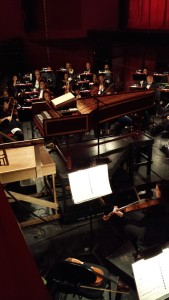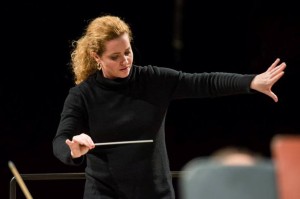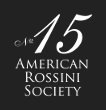Speranza Scappucci

Scappucci is well known to many Americans, having conducted an acclaimed series of performances of “La Cenerentola”for the Washington National Opera in May 2015. Some may have heard her in the Julliard production of “Il Turco” last fall which garnered praise in the New York Times. Most recently she led the troops in “La Fille du Regiemnt”in Santa Fe much to the delight of both audiences and her colleagues. Maestra is a very serious Rossinian and in fact conducted from the keyboard atop a platform built to raise the keyboard from the low pit at the Kennedy Center which allowed her to play the accompaniment.

Those who have heard her conduct will be delighted with the news of her upcoming appearance at the Rossini Opera Festival 2016. Those of you who haven’t, be prepared for a real treat.

Scappucci kindly agreed to answer some questions we posed to her after her visit to DC.
Q. What is your first musical memory?
A. I have to be honest, I do not remember because music has been in my life since I was a child. I started playing the piano at 4 and a half years old after I would go and see my older sister’s piano lessons. My family loves music and since I was a child I have heard music. My parents brought me to the opera at 7 years old!
Q. Many can imagine how pianists, vocalists, and instrumentalists may have gotten their start. But how does a conductor get her start?
A. I am a pianist myself , and actually I never dreamt to conduct as I was growing up. Conducting was the last step of a long musical preparation, from Rome to NYC at Julliard, from solo piano to collaborative piano and opera coaching , then assisting great conductors and finally the podium . It was a long “trip”.Stepping on the podium was the last natural step of a very long career behind the scenes.
Q. You studied at both Julliard and the Conservatorio di Santa Cecilia. How was the “student experience” different?
A. Not very different. The Rome Conservatory had wonderful teachers when I was there in the 80s -early 90s . I got a solid basis that allowed me to enter Julliard and pass all the theory classes. In fact at Juilliard, after just one year, I became a Ear Training Assistant and this because my harmony and composition skills were very strong from Italy. Julliard then gave me all the rest. I feel that I am a complete musician because of both schools. Julliard, of course, is international and so I feel lucky to have been part of it because it opened my eyes and ears to the world of music!
Q. There are some interesting youtube clips showing Maestro Riccardo Muti working with singers. It would seem that a much of the work is done individually. Is this the way you prefer to work as well?
A. The great “advantage” of having been a repetiteur/coach for many years allows me to be able to work with singers both individually and as a group. In other words, whenever I conduct an opera I really do my own music rehearsals. I think that this is a fundamental skill to be able to as the Italians say “ concertare” an opera. I work with the singers, then the chorus, then the orchestra and then it becomes a whole unity! This is the way Maestro Riccardo Muti does it, but also the way it was always done in the past by great conductors. I cannot work in any other way!
Q. When you have two different casts for a run of performances ( as there were for Cenerentola) does this require extra rehearsal time ( if you can get it!) or is it sufficient to work with the singers alone?
A. When I have two casts, I work the same amount of time and dedicate the same detailed work with both casts. It is very important for me to have all singers present at my music rehearsals, so that each one can listen to their colleagues. Each singer is different, and as a conductor my job is to be able to have the same music structure with both casts, leaving freedom to the individual to use their voice comfortably without compromising the grand picture!
Q. So, we have a couple of Rossini questions! American opera orchestras don’t play enough Rossini, is it difficult to guide them in the right direction when they do?
A. If the orchestra is made of good musicians, all it takes is to explain the style to them and they will get it! Rossini is very difficult, because it needs great technique, lightness of touch and beautiful sound all the time. To balance everything is a difficult task, but when it all comes together it is very satisfying.
Q. You made an observation something to the effect that Rossini has more in common with Mozart than he has with the other Bel Canto composers. As listeners we can sense that, but are things you could point out that might help us understand it better?
A. Rossini is much closer to Mozart, than we can imagine, especially early Rossini. The music is written in a quite vertical,classical manner. It needs transparency just like Mozart. Of course Rossini goes beyond and with its vocal “ bravura” and fiorituras it brings us to the so called bel-canto style . So occasionally there is freedom, but always in a very defined and perfect structure. There is no such thing as “ following” the singers in Rossini. You have to give the impression of freedom, but its all in a very well implanted architecture.
Q. We understand that you will be conducting at the Rossini Opera Festival. Have you ever attended any performances there?
A. I have never had the pleasure to attend the Rossini Opera Festival as a listener, because in the past years I was always working either as a pianist or as a conductor in other festivals. But I am very honored and excited to participate as a conductor in such a prestigious festival.
Q. Is there a particular Rossini opera you would like to conduct?
A.” Barbiere di Siviglia” of course, but I’ d love to do it in a new production and musically the way Rossini wrote it! It is a masterpiece. Also I’d love to tackle “ serious” Rossini as well, because it anticipated Verdi which I love very very much.
Thank you for answering our questions.
Speranza is active on Twitter: @speranzaascapp, Facebook, and her official website speranzascappucci.com.
Photo credit (featured image) : Silvia Lelli
